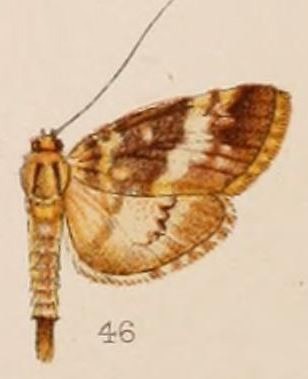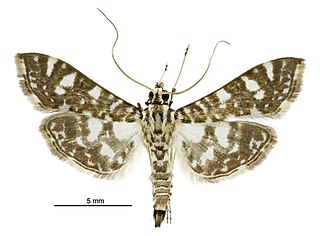
Pyraustinae is a large subfamily of the lepidopteran family Crambidae, the crambid snout moths. It currently includes about 1,280 species Most of them tropical but some found in temperate regions including both North America and Europe.

Spilomelinae is a very species-rich subfamily of the lepidopteran family Crambidae, the crambid snout moths. With 4,135 described species in 344 genera worldwide, it is the most speciose group among pyraloids.

Anania is a genus of moths of the family Crambidae described by Jacob Hübner in 1823.

Bocchoris is a genus of moths of the family Crambidae described by Frederic Moore in 1885.

Eoophyla is a genus of moths of the family Crambidae. It was erected by Charles Swinhoe in 1900.

Evergestis is a genus of moths of the family Crambidae described by Jacob Hübner in 1825. A number of species are pests, including the cross-striped cabbageworm, a pest of cole crops such as cabbage.

Glyphodes is a genus of moths of the family Crambidae described by Achille Guenée in 1854.

Herpetogramma is a genus of moths in the family Crambidae described by Julius Lederer in 1863. It currently comprises 106 species that are found in North America, Eurasia, Australia, New Zealand, Central and South America. Of the few species where host plants are known, the larvae mostly feed on grasses.

Udea is a genus of snout moths in the subfamily Spilomelinae of the family Crambidae. The genus was erected by Achille Guenée in 1845. The currently known 216 species are present on all continents except Antarctica. About 41 species are native to Hawaii.

Lygropia is a genus of snout moths in the subfamily Spilomelinae of the family Crambidae. It currently comprises 66 species, which are mostly found in the tropical and subtropical regions of the Americas, Africa and Asia, but not in Australia.

Palpita is a genus of moths of the family Crambidae. Members of the moth genus Stemorrhages may be very similar in appearance.

Scoparia is a grass moth genus of subfamily Scopariinae. Some authors have assigned the synonymous taxon Sineudonia to the snout moth family (Pyralidae), where all grass moths were once also included, but this seems to be in error.

Thliptoceras is a genus of moths of the family Crambidae. The genus was erected by William Warren in 1890.

Chabulina onychinalis, also known as the swan flower plant moth and until recently called Glyphodes onychinalis, is a moth of the family Crambidae. It is native to the Afro-Asian Region, including India, Sri Lanka, Hong Kong, Thailand, Indonesia, Japan, Australia and New Zealand, and has been recorded in California since 2000.

Glyphodella is a genus of moths of the family Crambidae from Africa.
Udeoides is a genus of snout moths of the subfamily Spilomelinae in the family Crambidae. The genus was described by Koen Maes in 2006 and distinguished from the related genus Udea. All six species are distributed in the Afrotropical realm.
Musotiminae is a subfamily of the lepidopteran family Crambidae. It was described by Edward Meyrick in 1884

Scopariinae is a subfamily of the lepidopteran family Crambidae. The subfamily was described by Achille Guenée in 1854.
Thivolleo meruensis is a moth in the family Crambidae. It was described by Koen V. N. Maes in 2006. It is found in Kenya.

Margaroniini is a tribe of the species-rich subfamily Spilomelinae in the pyraloid moth family Crambidae. The tribe was erected by Charles Swinhoe and Everard Charles Cotes in 1889, originally as family Margaronidae.














